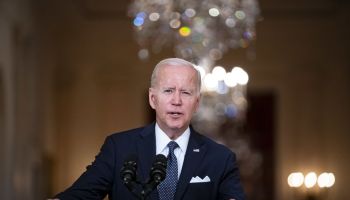Fed up with the stalled peace talks, the Palestinian leader defies Israel and vents about Obama.
by Dan Ephron
We’re somewhere over the Mediterranean, and Mahmoud Abbas, the Palestinian president, is trying to get inside the head of Barack Obama. “We knew him before he became president,” he’s saying, struggling to understand what happened to the man who had seemed more sympathetic to the Palestinian cause than any of his predecessors. “We knew him and he was very receptive.” Around us, Abbas’s closest aides are shuffling papers or typing on laptops, while his bodyguards lounge on long corduroy couches. Saeb Erekat, the ubiquitous adviser, is writing talking points for Abbas’s meeting the next day with French President Nicolas Sarkozy. A man with a sidearm is shoveling pumpkin seeds into his mouth. In a space the size of two living rooms, most of the 20-odd passengers are puffing on cigarettes, and so is Abbas. At 76, he smokes more than two packs a day.
Abbas is about as affable as politicians come—even hawkish Israelis like Ariel Sharon have said so. But occasionally, he can deliver a shot of scathing criticism, usually followed by a grandfatherly smile. A week earlier, he told me bluntly that Obama had led him on, and then let him down by failing to keep pressure on Israeli Prime Minister Benjamin Netanyahu for a moratorium on settlement building in the West Bank last year. “It was Obama who suggested a full settlement freeze,” Abbas explained. “I said OK, I accept. We both went up the tree. After that, he came down with a ladder and he removed the ladder and said to me, jump. Three times he did it.” Abbas also criticized the mediation efforts of Obama’s special envoy, George Mitchell, who has shuttled between Israelis and Palestinians for more than two years. “Every visit by Mitchell, we talked to him and gave him some ideas. At the end we discovered that he didn’t convey any of these ideas to the Israelis. What does it mean?”
Now, on the flight from Tunis to Paris, I wanted to know how long Abbas could wait. The next 18 months are probably dead time in Israeli-Palestinian diplomacy as Obama focuses on his reelection campaign. No candidate for president wants to risk alienating Israel’s supporters by pressing the peace question. But a second-term president can be bolder. Bill Clinton, after his reelection in 1996, managed to get an Israeli agreement for a partial West Bank withdrawal. Netanyahu remembers it well: he was prime minister at the time. But Abbas, who has worked every angle for Palestinian statehood for 50 years, the last six as president, says he’s nearly out of time. “I cannot wait. Somebody will wait instead of me,” he tells me. “And I will not stay more.”
As the Middle East undergoes profound transformation, Americans can count on one thing in the region remaining the same: the unresolved Israeli-Palestinian conflict will continue to be an irritant for Arabs and a source of resentment against the United States. Abbas offered the best hope for peace between the two sides when he took over for Yasir Arafat in 2004. Moderate in his approach to Israel and unequivocally against violence, he was the counterpoint to Arafat’s wiliness and eccentricity.
Story Compliments Of Newweek.com
















